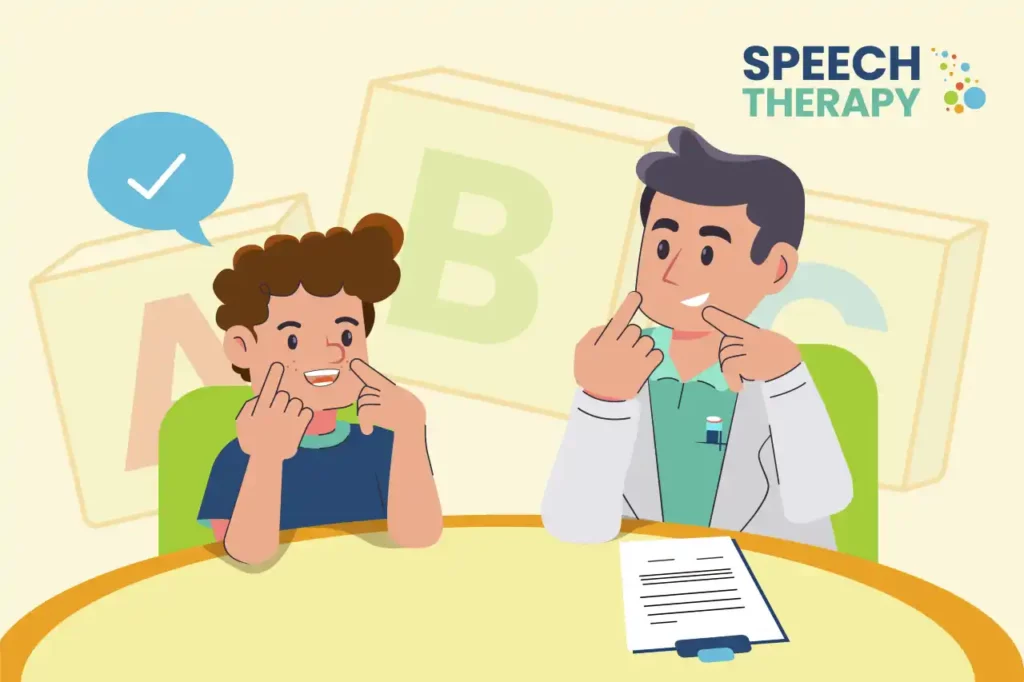
Written by
Akshaya Krishnan
M.Sc. Speech Language Pathologist

Written by
Savitha Thomas,
BASLP, Speech Language Pathologist
Do you have a child, a family member, or a friend who has difficulty communicating their needs and emotions effectively? If yes, read further to know how you can help. Be it a child or an adult, speech and language therapy offers interesting and fun-filled activities to develop and improve communication skills. This article will help you get an insight into some of the different strategies and activities in speech therapy that help improve communication skills.
What Are the Different Types and Activities of Speech Therapy?
Speech Language Pathologists work with individuals across all age groups. They use different strategies depending on the age, type, and severity of the disorder.
Language Therapy
Language therapy, in brief, helps an individual to communicate verbally. To communicate verbally, the individual should first understand what the other person is saying (verbally). Speech Language Pathologists work on the individual’s ability to understand and express language by improving his/her listening skills, grammar skills, vocabulary skills, social language skills, and reading skills. They achieve this through different activities and techniques which are customized and individualized.
Articulation Therapy
Articulation is the pronunciation of different sounds. Speech Language Pathologists use articulation therapy to help individuals who make errors while pronouncing different sounds. They do this by demonstrating the correct placement of the articulators. Speech therapists use multiple techniques and approaches such as Phonetic placement therapy, Minimal Pair approach, Core vocabulary approach, Cycles approach, Distinctive feature therapy, etc., along with cueing techniques depending on the individual to make him/her pronounce the word correctly.
Oral Motor Therapy
Individuals with weakness or stiffness of the oral musculature benefit from oral motor therapy. Speech therapists use oral exercises that may include facial massages, blowing, sucking, chewing, and biting to strengthen the muscles of the oral musculature. These exercises not only improve better speech production but also help enhance the individual’s awareness and efficiency during eating, drinking, and swallowing.
Fluency Therapy
Fluency therapy helps those individuals whose rate, continuity, or flow of speech is affected. Problems in fluency can negatively impact one’s communication and influence the overall quality of life. Speech therapists help improve fluency in the speech by using different techniques like prolongation technique, modified airflow technique, lilypad technique, etc.
Auditory Verbal Therapy
This type of therapy facilitates children with Hearing Impairment. AVT follows a particular hierarchy to help children with hearing loss understand sounds and speech. It starts with sound awareness, followed by sound discrimination, sound identification, and sound comprehension. It is recommended to start AVT as soon as the child is fitted with the hearing aid/aids.
Voice Therapy
Voice therapy is recommended for individuals who suffer a change in voice pitch, quality, or loudness. Speech Language Pathologists provide vocal hygiene programs and voice exercises to improve voice and vocal behavior. Various techniques used in voice therapy are resonant voice therapy, vocal function exercises, digital manipulation, semi-occluded vocal tract exercises, etc. depending on the type and severity of voice disorder.
Activities in Speech Therapy
Activities to Try with Children at Home
Home training is very important for children with speech and language disorders. Parents can use various activities at home to improve the speech, language, and communication skills of a child. The activities should be carried out as per the instructions and prescription of a Speech Language Pathologist. Practicing speech therapy at home enhances parent-child interaction. So, never hesitate to seek the help of a speech-language pathologist for choosing activities that are best suited for your child’s needs. Below are a few activities that can be practiced at home:
Interact with your child
Interaction is the first step to developing communication skills. Parents should interact with their children as much as possible even if the child is too young to understand. It is a well-known fact that we speak what we hear. When the people around the child interact with him/her the most, it invariably improves the child’s language skills and communication ability.
Play with children
Play helps a child to learn better. Pretend play is one of the best activities to help your child improve their language skills. While playing, make sure you talk to your child and allow them to talk and respond to your suggestions. It ensures interaction. You can give instructions while playing to improve their understanding of verbal commands. You can develop receptive and expressive vocabulary by asking them to name the things and items involved in the play.
Imitation
Help the child to imitate your actions including hand actions, facial expressions, and sounds through play activities and reward them for their correct response. Children imitate before they start to speak. Imitation is the stepping stone to verbal communication. Children learn and improve their communication by imitating actions and sounds followed by words and sentences.
Memory games
Memory games help in stretching your child’s brain. Games such as board games, matching object to object/picture to object, etc. will develop their visual memory and sustained attention. Memory games help improve cognitive skills along with language skills.
Oro motor exercises
These exercises help those individuals who have weak or stiff muscles of the oral musculature. Different articulators have different exercises. One of them is tongue elevation exercises which help improve the strength and flexibility of the tongue for better speech clarity.
Are These Activities Effective?
The above-mentioned activities are effective if done the right way. But there are many factors involved that may hinder or facilitate the treatment progress. We need to keep in mind that not every technique will work the same way for everyone. One technique may facilitate a child while the same technique may not help another child. The effectiveness of therapy depends on many factors like personal, environmental, and social factors.
Do they have Any Side effects?
There are no direct side effects of speech therapy. However, overstimulation of language may lead to echolalia, which is the repetition of words and sentences. Everything should be within limits for it to be benefitting. In the case of fluency disorders (especially stuttering), there are high chances of relapse even when the individual has come out of it. Any situation, person, or word can trigger the occurrence of disfluencies in an individual.
Can I Do Speech Therapy Myself?
You can do speech therapy under the guidance of a speech therapist. A licensed Speech Language Pathologist is trained and has the clinical competence for conducting speech and language assessments and therapy. It is the parent’s responsibility to give adequate home training for their children for better treatment results.
It is not advisable to watch a few videos or read through the internet and try speech therapy activities at home without appropriate guidance. Without a concrete understanding of the skill needs and different speech therapy techniques, a therapy program may not be meaningful and may fail to yield desired results. We, speech therapists, are here to help you out whatever your child or loved one’s speech concern may be!
Things To Do At Home For Your Child
Here are a few strategies to help your child speak:
- Spend time with your children, talk to them and improve parent-child interaction.
- Use simple words to communicate with your child.
- Tell stories at bedtime.
- Read books to your child.
- Reduce screen time.
- Explain things in the immediate environment.
- Never compare your child with other children.
How Effective is Speech Therapy?
Studies reveal that an average of 6 hours of speech and language therapy for 6 months can produce significant improvement in the performance of individuals with any kind of speech and language impairment. Remember speech therapy is a slow process. Various factors involved have a direct effect on the improvement while following speech therapy.
Benefits of Speech Therapy include
- Clearer speech.
- Improved listening skills.
- Greater independence.
- Better expression.
- Better socialization.
- Improved communication.
- Improved self-respect.
- Improved ability to understand and express emotions, and thinking.
- Enhanced vocal quality.
- Better swallowing function.
- Improved quality of life.
Conclusion
A speech-language pathologist chooses activities and techniques that are most beneficial and appropriate to make your child communicate effectively. If you feel your child may need speech therapy, do not delay contacting a qualified and experienced speech-language therapist.
Speech therapy is not a quick process; it may take time to improve your child’s speech and language skills. As a parent, it is necessary to have patience and continue home programs as per the therapist’s advice. The success of therapy depends largely on the quality of practice. Never compromise on quality practice as improved communication skills will invariably improve your child’s confidence and quality of life.
Reference: https://prayatna.co.in/?s=speech+therapy
Integrating Technology into Speech Therapy: Pros and Cons.
How Speech Therapy Can Help Children with Autism Spectrum Disorder
Tips for Parents: Supporting Your Child’s Speech Therapy at Home/a Parental Guide



